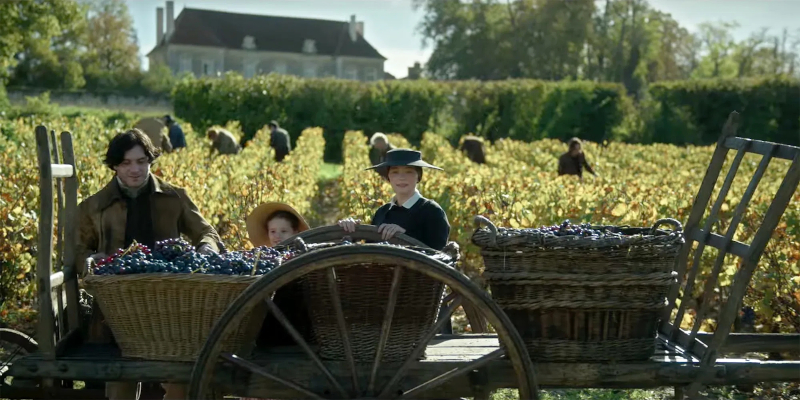Director – Thomas Napper – 2023 – UK – Cert. 15 – 90m
****
A nineteenth century French widow innovates in the male-dominated world of champagne production – out in UK cinemas on Friday, August 23rd
In the early nineteenth century, Veuve Clicquot established itself as something of an innovation in the world of champagne. You would imagine that if anyone were to make a period picture about it, it would be the French, but as may well be guessed from the English language translation title here, this is a British production using English actors speaking English.
There’s nothing whatsoever wrong with that, but given that France has a sizeable movie industry which, among other things, often makes period costume dramas, watching a film about an historical period in that country in English feels decidedly odd. Perhaps if there were more of an epic sense of scale (think: Napoleon, Ridley Scott, 2023) it might feel less so. The screenplay is based on a book by North American writer Tilar J. Mazzeo.
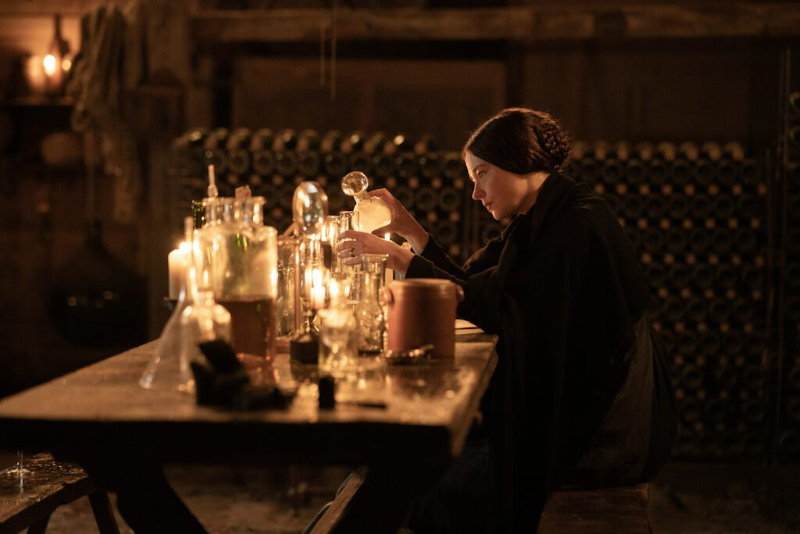
Perhaps it’s explained with greater clarity in the book, but the film assumes a familiarity on the part of the audience with the ins and outs of the Napoleonic Wars, which take place in the backdrop of the film and on the edge of the narrative, affecting it from a distance, as it were. Late on, one sequence stages a battle in terms of distant sounds and plumes of smoke (but nothing more) visible over the next hill from the Clicquot estate: the conflict is very close indeed, and threatens to erupt into the main narrative, but never quite does.
That said, negotiations with Russia involve sending a shipment around a blockade in contravention of Napoleonic trade prohibition, but the film, like the Clicquot widow, stays resolutely on the estate while such things happen elsewhere and news of progress is awaited.
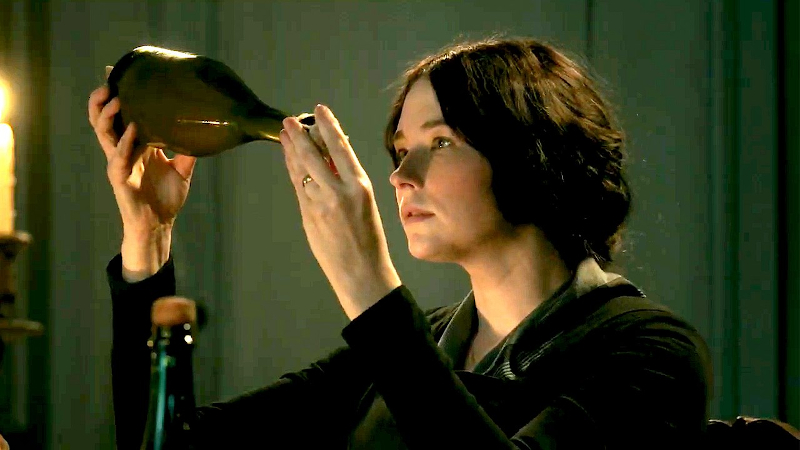
At the centre is a powerhouse performance by Hayley Bennett as Barbe-Nicole Clicquot, who as in Cyrano (Joe Wright, 2021) successfully holds the audience’s attention throughout. She is completely believable as the woman whose husband has died and left her his vineyard having tutored her in its ways as he understands them, extolling to her, for instance, the virtues of singing to the vines.
As with the Napoleonic Wars, the wine business is just there as part of the story’s backdrop without the screenplay offering any real explanation of the process: if you want to learn about wine- or champagne cultivation, this is not the place to come.
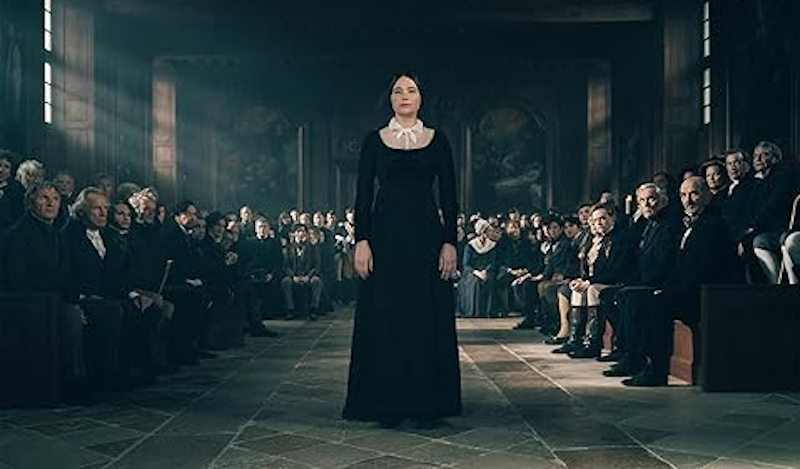
What it does much better, and the reasons to see it, are twofold. On the one hand, this is a reasonably compelling picture of a businesswoman in a time and culture when such things were done by men alone, and on the other it explores three separate romances of a love triangle.
As a widow running her late husband’s estate, Mme. Clicquot must contend with her father-in-law Philippe (Ben Miles), accountant, estate manager, wine dealer, not to mention rivals who want to buy the premises and her business. Despite the assumption to this effect by potential buyer M. Moet and her own solicitor, Mme. Clicquot has no intention of selling up.
Rather, she wants to experiment with the champagne production process and see if she can come up with something very special while living off the unremarkable but established and therefore saleable wine she also produces. However, this plan threatens to bankrupt her before yielding profit.
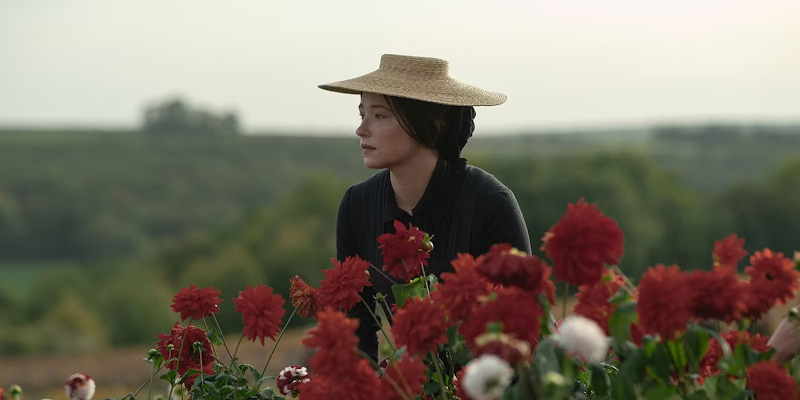
Although the film is very much about what happens following her husband’s death, a skilfully orchestrated flashback narrative strand deals with the marital relationship while her husband François (Tom Sturridge) was still alive. There are (suggestive rather than explicit) scenes in the bedroom displaying a clear warmth between husband and wife, also expressed in exterior scenes of his showing her the vines up close and getting her to sing to them. However, as the relationship proceeds, he begins to succumb to mental illness.
Before that fully kicks in, she further becomes aware that her husband has a male friend in his trusted wine seller Louis Behne (a supremely well-crafted performance from Sam Riley) who is just as close to her husband as she is, indeed (as it turns out) far more so. This material is deftly handled so that you see very little on the screen but infer exactly what’s going on between the two men.
She shrewdly tolerates this gay relationship rather than allowing herself to become threatened by it, so much so that Louis becomes a good friend and trusted business associate to her as much as to her husband, a state which later stands her in very good stead as a businesswoman in a male-dominated society.
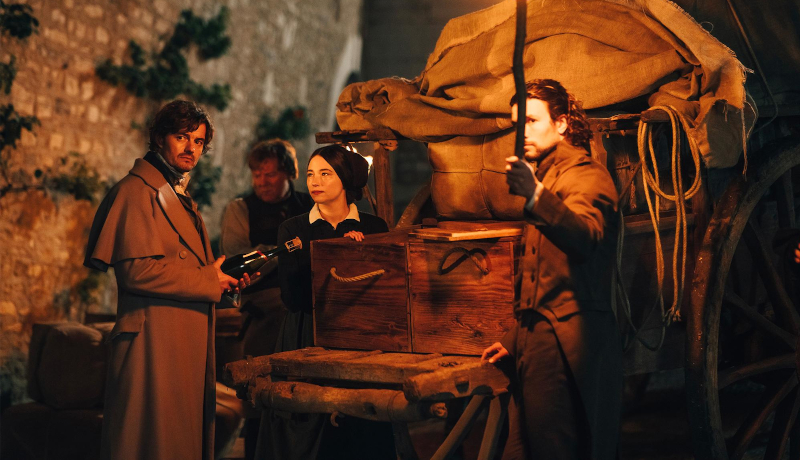
Louis is very good at his job, and both husband and wife have a well-founded trust is his abilities. This comes into play after François’ death when she entrusts Louis with getting a wagon of prototype champagne across or around the Russian front to a potential buyer in St. Petersburg. Despite his sexual preferences, and his open admonishment to her that “you know what I am”, she finds herself drawn to him…
She finds a further ally and confidant in her father-in-law’s clerk, Edouard Werle (Anson Boom).
Caroline Champetier’s lavish cinematography turns the falling of light within static compositions in the large family house into the equivalent of Rembrandt paintings. Given that the story takes place in France rather than Holland, this seems an ill-judged choice since, while it looks incredible, it inevitably brings all sorts of non-French baggage into the imagery.
Nevertheless, at a well-paced 90 minutes, the film races by, and certainly never outstays its welcome. If you can overlook its flaws, it might be the perfect, undemanding matinee movie.
Widow Clicquot is out in cinemas in the UK on Friday, August 23rd.
Trailer:
